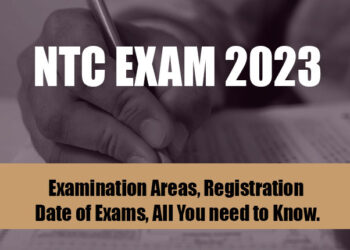The Ghana Education Service (GES) Promotion Examinations are a significant event for educators aiming to advance in their careers. The exams scheduled for August 2024 mark a critical juncture for many educators, with the Principal Superintendent/Assistant Director II exams on Tuesday, 20th August, and the Assistant Director I and Deputy Director exams on Wednesday, 21st August.
As the exams approach, many applicants are rigorously preparing, often turning to online study groups and various resources. However, with the rise of these online platforms, there has been an unfortunate spread of misinformation, leaving some applicants vulnerable to incorrect guidance.
As a concerned GES staff member, I aim to debunk some of these myths and provide accurate information to help colleagues avoid pitfalls and ensure they are well-prepared.
Changes in GES and MoE
The confusion among many applicants stems largely from the changes in the legal framework governing education in Ghana. The Ghana Education Service (GES) Aptitude Test was first introduced in February 2020, under the Pre-tertiary Education Act, 2008 (Act 778).
However, significant changes have occurred since then, notably with the enactment of the Education Regulatory Bodies Act, 2020 (Act 1023), and the Pre-tertiary Education Act, 2020 (Act 1049). These changes have led to amendments and realignments within the education system that are critical for applicants to understand.
GES Council Members and Their Tenure of Office
One key area of confusion is the composition and tenure of the GES Council. Under the GES Act 506 (1995), the Council comprised 15 members. However, the Pre-tertiary Education Act, 2020, Clause 10, has reduced this number to 12.
Additionally, while the tenure of office was previously three years, the new Act extends it to four years, with eligibility for only one additional term. This is a critical update that applicants who are going to write this year’s GES promotion exams must be aware of, as it directly impacts their understanding of the governance of the GES.
Divisions at the GES Headquarters: Then and Now
Another area where misinformation is rampant is the number of functional divisions at the GES Headquarters. In February 2020, there were 10 divisions, with 3 under the Deputy Director-General, Management Services, and 7 under the Deputy Director-General, Quality and Access. However, this structure has since been drastically altered.
Today, the divisions have been reduced to five, with only two divisions (Special Education Division and Schools and Instructions Division) under the Deputy Director-General, Quality and Access. The remaining three divisions (HRMD, Finance, and Administration) are under the Deputy Director-General, Management Services.
This reduction in divisions is a significant shift that applicants must understand, especially when answering questions related to the GES’s current organizational structure.
TVET: No Longer a GES Division
One of the most critical updates that many applicants have missed is the status of the Technical and Vocational Education Division (TVET). TVET is no longer a division under the GES Headquarters; it has been elevated to a full agency under the Ministry of Education, gaining autonomy from the GES on 14th December 2021. This means that any questions related to TVET being a division of GES are outdated and incorrect.
Stakeholders in Education: Membership and Roles
Another area of confusion for those who are due to write the GES promotion exam revolves around who constitutes a stakeholder in education and their roles within the GES. It is important to note that while stakeholders such as PTA, SMC, Board of Governors, NGOs, and international partners like the World Bank, UNICEF, UNESCO, JAICA, and USAID play crucial roles in education, they are not members of the GES. They do not appear on the GES payroll and should not be confused with actual members of the Ghana Education Service.
The Evolution of COTVET and CTVET
Before the establishment of Act 1023, the Council for Technical and Vocational Education and Training (COTVET) regulated all technical institutions in the country. This was in conjunction with the National Board for Professional and Technical Examination (NABPTEX), which was also an agency under the Ministry of Education.
However, with the establishment of Act 1023, these two bodies have merged to form the Commission for Technical and Vocational Education and Training (CTVET). As a result, both COTVET and NABPTEX are now defunct, and applicants should update their knowledge accordingly.
Concurrent Establishment of Education Regulatory Bodies Act, 2020, and Pre-tertiary Education Act, 2020
The concurrent establishment of the Education Regulatory Bodies Act, 2020 (Act 1023), and the Pre-tertiary Education Act, 2020 (Act 1049), has led to the creation of several regulatory and policy-implementing bodies. Under Act 1023, the following regulatory bodies have been established:
- Ghana Tertiary Education Commission (GTEC)
- National Teaching Council (NTC)
- National Schools Inspectorate Authority (NaSIA)
- National Council for Curriculum and Assessment (NaCCA)
- Commission for Technical and Vocational Education and Training (CTVET)
Meanwhile, the Pre-tertiary Education Act, 2020, has established the following:
- Ghana Education Service (GES)
- Ghana Technical and Vocational Education and Training (TVET) Service
It is crucial to note the distinction between these two Acts: while GES and TVET Service are policy-implementing bodies, the bodies established under Act 1023 are regulatory bodies. GES is currently regulated by the NTC, NaCCA, and NaSIA, while the TVET Service is regulated by CTVET and GTEC.
Additional Information for this Year’s GES promotion Applicants
To ensure that all applicants are well-prepared to write the GES promotion exam, here are some key figures and their roles in the current educational landscape:
- Minister of Education: Dr. Yaw Adutwum
- Deputy Minister of Education (Pre-tertiary): Hon. John Ntim Fordjour
- Deputy Minister of Education (TVET): Prof. Kingsley Nyarko
- Chief Director, MoE: Mrs. Mamle Andrews
- PRO, Ministry of Education: Kwasi Kwarteng
- Director-General, GES: Dr. Eric Nkansah
- Deputy Director-General, Management Services: Stephen Kwaku Owusu
- Deputy Director-General, Quality and Access: Dr. Kwabena Bempah Tandoh
- PRO, GES: Cassandra Twum Ampofo
- Chairman, GES Council: Mr. Michael Kenneth Nsowah
- Director-General, TVET Service: Mr. David Prah
- Chairman, TVET Service Council: Nana Wireko Ampem
- Director-General, CTVET: Dr. Fred Kyei Asamoah
- Director-General, NaCCA: Prof. Yayra Dagadzi
- Director-General, GTEC: Prof. Abdulai Jinapor
- Director-General, NaSIA: Hagar Hilda Ampadu
Number of Members on Board of Education Service and Regulatory Bodies
- Number of Ghana Education Service (GES) Council Members: 12
- Number of Technical and Vocational Education and Training (TVET) Service Council Members: 13
- Number of National Council for Curriculum and Assessment (NaCCA) Board Members: 9
- Number of National Schools Inspectorate Authority (NaSIA) Board Members: 11
- Number of Commission for Technical and Vocational Education and Training (CTVET) Board Members: 11
- Number of Ghana Tertiary Education Commission (GTEC) Board Members: 13
- Number of National Teaching Council (NTC) Board Members: 15
| Service & Regulatory Bodies | Number of Members |
|---|---|
| GES | 12 |
| TVET | 13 |
| NaCCA | 9 |
| NaSIA | 11 |
| CTVET | 11 |
| GTEC | 13 |
| NTC | 15 |
Conclusion
As the GES Promotion Examinations draw near, it is imperative that applicants equip themselves with accurate and up-to-date information. The changes in the educational landscape, particularly those stemming from the Education Regulatory Bodies Act, 2020, and the Pre-tertiary Education Act, 2020, are critical to understanding the current dynamics within the GES and MoE.
By dispelling myths and providing clarity, this guide aims to empower all applicants to approach their exams with confidence, ensuring they are well-prepared to achieve success.







